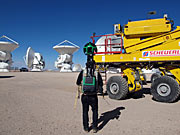Annonce
All ESO’s Observatories Included in Google Street View
10 juin 2014
ESO's observing sites at Paranal Observatory, La Silla Observatory and the Atacama Large Millimeter/submillimeter Array (ALMA), and have now been included in spectacular 360-degree panoramic views from Google's Street View, now available on Google Maps.
Google Street View team visited each of ESO’s three world-class observing sites in Chile: Paranal Observatory at an altitude of 2635 metres — home to the VLT at Paranal Observatory — ESO’s flagship facility; La Silla Observatory — ESO’s first observatory on the outskirts of the Atacama Desert — 2400 metres above sea level; as well as the two ALMA sites — the ALMA Array Operations Site (AOS), high on Chajnantor Plateau at 5000 metres above sea level and the international ALMA base camp at the Operations Support Facility (OSF) at 2900 metres.
Instead of the perhaps more well-known Google Street cars, Google now is able to cover such high and remote locations using what is known as a Google Trekker. The special equipment by Google includes, at its core, an 18-kilogramme backpack which consists of 15 lenses angled at different directions so that the images can be stitched together into 360-degree views. As the operator walks, images are taken roughly every 2.5 seconds in remarkable quality.
Google Street view now allows everyone to explore each of the three observing sites from their own home and immerse themselves beneath ESO’s world-class telescopes. Viewers can place themselves on the platform of the VLT among the four 8.2m diameter Unit Telescopes (UTs) and four 1.8-metre Auxiliary Telescopes (ATs) which make up the ESO Very Large Telescope Interferometer (VLTI); overlook La Silla where ESO operates two of the most productive 4-metre class telescopes in the world — the New Technology Telescope (NTT) and the ESO 3.6-metre Telescope; and venture to the extremely high altitude on Chajnantor Plateau among an icy scene of the various antennas which make up the ALMA array.
In addition to ESO’s observatories, tourism attractions such as the Huilo-Huilo Reserve in southern Chile and the Humberstone saltpeter works in northern Chile were recently added to Google Street View, which has included images of Chile since 2012. The street view in Chile also includes one of the highest streets in the world, Chile Route 27. Additional locations in Chile will follow over the coming year.
Access to the ESO observatories through Google Street View is given here:
- ALMA Array Operations Site (OSF)
- ALMA Operations Support Facility (AOS)
- Paranal Observatory
- La Silla Observatory
If you want an even more detailed look at the ESO facilities, the ESO Virtual Tours of the different ESO facilities in Chile and and the Headquarters in Germany will do the job:
Notes
The Atacama Large Millimeter/submillimeter Array (ALMA), an international astronomy facility, is a partnership of Europe, North America and East Asia in cooperation with the Republic of Chile. ALMA is funded in Europe by the European Southern Observatory (ESO), in North America by the U.S. National Science Foundation (NSF) in cooperation with the National Research Council of Canada (NRC) and the National Science Council of Taiwan (NSC) and in East Asia by the National Institutes of Natural Sciences (NINS) of Japan in cooperation with the Academia Sinica (AS) in Taiwan. ALMA construction and operations are led on behalf of Europe by ESO, on behalf of North America by the National Radio Astronomy Observatory (NRAO), which is managed by Associated Universities, Inc. (AUI) and on behalf of East Asia by the National Astronomical Observatory of Japan (NAOJ). The Joint ALMA Observatory (JAO) provides the unified leadership and management of the construction, commissioning and operation of ALMA.
Contacts
Lars Lindberg Christensen
Head of ESO ePOD
ESO ePOD, Garching, Germany
Tel: +49 89 3200 6761
Cellular: +49 173 3872 621
E-mail: lars@eso.org
À propos de l'annonce
| Identification: | ann14047 |
Our use of Cookies
We use cookies that are essential for accessing our websites and using our services. We also use cookies to analyse, measure and improve our websites’ performance, to enable content sharing via social media and to display media content hosted on third-party platforms.
ESO Cookies Policy
The European Organisation for Astronomical Research in the Southern Hemisphere (ESO) is the pre-eminent intergovernmental science and technology organisation in astronomy. It carries out an ambitious programme focused on the design, construction and operation of powerful ground-based observing facilities for astronomy.
This Cookies Policy is intended to provide clarity by outlining the cookies used on the ESO public websites, their functions, the options you have for controlling them, and the ways you can contact us for additional details.
What are cookies?
Cookies are small pieces of data stored on your device by websites you visit. They serve various purposes, such as remembering login credentials and preferences and enhance your browsing experience.
Categories of cookies we use
Essential cookies (always active): These cookies are strictly necessary for the proper functioning of our website. Without these cookies, the website cannot operate correctly, and certain services, such as logging in or accessing secure areas, may not be available; because they are essential for the website’s operation, they cannot be disabled.
Functional Cookies: These cookies enhance your browsing experience by enabling additional features and personalization, such as remembering your preferences and settings. While not strictly necessary for the website to function, they improve usability and convenience; these cookies are only placed if you provide your consent.
Analytics cookies: These cookies collect information about how visitors interact with our website, such as which pages are visited most often and how users navigate the site. This data helps us improve website performance, optimize content, and enhance the user experience; these cookies are only placed if you provide your consent. We use the following analytics cookies.
Matomo Cookies:
This website uses Matomo (formerly Piwik), an open source software which enables the statistical analysis of website visits. Matomo uses cookies (text files) which are saved on your computer and which allow us to analyze how you use our website. The website user information generated by the cookies will only be saved on the servers of our IT Department. We use this information to analyze www.eso.org visits and to prepare reports on website activities. These data will not be disclosed to third parties.
On behalf of ESO, Matomo will use this information for the purpose of evaluating your use of the website, compiling reports on website activity and providing other services relating to website activity and internet usage.
Matomo cookies settings:
Additional Third-party cookies on ESO websites: some of our pages display content from external providers, e.g. YouTube.
Such third-party services are outside of ESO control and may, at any time, change their terms of service, use of cookies, etc.
YouTube: Some videos on the ESO website are embedded from ESO’s official YouTube channel. We have enabled YouTube’s privacy-enhanced mode, meaning that no cookies are set unless the user actively clicks on the video to play it. Additionally, in this mode, YouTube does not store any personally identifiable cookie data for embedded video playbacks. For more details, please refer to YouTube’s embedding videos information page.
Cookies can also be classified based on the following elements.
Regarding the domain, there are:
- First-party cookies, set by the website you are currently visiting. They are stored by the same domain that you are browsing and are used to enhance your experience on that site;
- Third-party cookies, set by a domain other than the one you are currently visiting.
As for their duration, cookies can be:
- Browser-session cookies, which are deleted when the user closes the browser;
- Stored cookies, which stay on the user's device for a predetermined period of time.
How to manage cookies
Cookie settings: You can modify your cookie choices for the ESO webpages at any time by clicking on the link Cookie settings at the bottom of any page.
In your browser: If you wish to delete cookies or instruct your browser to delete or block cookies by default, please visit the help pages of your browser:
Please be aware that if you delete or decline cookies, certain functionalities of our website may be not be available and your browsing experience may be affected.
You can set most browsers to prevent any cookies being placed on your device, but you may then have to manually adjust some preferences every time you visit a site/page. And some services and functionalities may not work properly at all (e.g. profile logging-in, shop check out).
Updates to the ESO Cookies Policy
The ESO Cookies Policy may be subject to future updates, which will be made available on this page.
Additional information
For any queries related to cookies, please contact: pdprATesoDOTorg.
As ESO public webpages are managed by our Department of Communication, your questions will be dealt with the support of the said Department.


